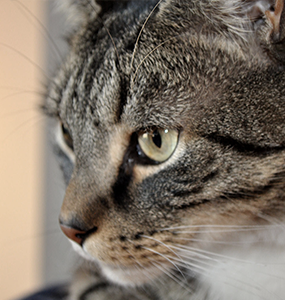CLIENT ALERT!!!!!
Since Monday, we have seen 2 rattlesnake bites, heard about 3 more and have treated 2 cases of rat poison ingestion.
Please, please, please take care when hiking with your dogs! Keep them on leash at all times and watch the path before you.
Please, please, please make sure that any rat poison is up and away from where your pets may get into it!
Wednesday, April 9, 2014
Friday, April 4, 2014
The dangers of rat poison to dogs and cats
Dr. Justine Lee, DVM, DAVCECC, DABT
Posted May 04, 2012 in Pet Health
Share This Story
8
806
8967

Dr. Justine Lee explains the dangers of active ingredients in rat and mouse poisons. For more from Dr. Lee, find her on Facebook!
As the weather gets colder, mice and rats start seeking shelter in warm locations… in other words, your house! Unfortunately, the start of autumn means the start of mouse and rat poisoning, putting your dog or cat at risk.
In today’s blog, we’ll talk about the 4 different types of active ingredients found in these mouse and rat poisons. These poisons all work (and kill) in different ways, so pay heed!
While the most common type of mouse poison (e.g., brodifacoum, bromadiolone, etc.) often affects your dog’s ability to clot properly, new EPA mandates by the government are reducing the availability of this specific type of poison (called an anticoagulant rodenticide or “ACR”). Unfortunately, this means that newer, different types of poisons are cropping up. Not even all veterinarians are aware of these newer active ingredients!
Depending on what type of mouse and rat poison was ingested, clinical signs can vary. When in doubt, please don’t use these poisons around your house if you have pets. I’m never an advocate of using these types of poisons, as they pose a threat to wildlife, pets, and birds of prey (e.g., raptors like red-tail hawks, owls, etc.). I’d rather you use the more human snap trap – much safer to you and your pet!
 Anticoagulant rodenticides (ACR)
Anticoagulant rodenticides (ACR)These ACRs inhibit the production of Vitamin-K dependent blood clotting factors (made in the liver), so when ingested in toxic amounts by dogs or cats, it can result internal bleeding. Thankfully, there’s an antidote for this type of mouse and rat poison: Vitamin K1, a prescription medication readily available at your veterinarian. With ACR poisoning, clinical signs don’t take affect for 3-5 days. However, left untreated, ACR poisoning can be fatal. Signs to look out for include:
- Lethargy
- Difficulty breathing
- Pale gums
- Coughing (especially of blood)
- Vomiting (with blood)
- Bloody nose
- Swelling or bumps on the skin (e.g., hematomas)
- Collapse
- Bleeding from the gums
- Death
Treatment includes decontamination, Vitamin K1 orally (typically for 30 days), blood transfusions, plasma transfusions, oxygen, and supportive care.
Cholecalciferol (Vitamin D3)
As an emergency critical care veterinary specialist, this is my most hated type of poisoning. Only a small amount can result in severe poisoning in both dogs and cats. This type of mouse and rat poison results in an increased amount of calcium in the body, leading to kidney failure. Unfortunately, this type has no antidote, and is very expensive to treat, as pets typically need to be hospitalized for 3-7 days on aggressive therapy. Clinical signs include:
As an emergency critical care veterinary specialist, this is my most hated type of poisoning. Only a small amount can result in severe poisoning in both dogs and cats. This type of mouse and rat poison results in an increased amount of calcium in the body, leading to kidney failure. Unfortunately, this type has no antidote, and is very expensive to treat, as pets typically need to be hospitalized for 3-7 days on aggressive therapy. Clinical signs include:
- Inappetance/anorexia
- Lethargy/weakness
- Decreased or increased thirst/urination
- Halitosis
- Kidney failure
- Tremors
- Weight loss
- Death
Treatment includes aggressive IV fluids to flush the calcium and kidney poisons out, medications to help decrease the body’s calcium level (e.g., pamidronate, calcitonin, steroids, diuretics), and frequent blood work monitoring.
 Bromethalin
BromethalinWhile this type of mouse and rat poison sounds like some ACR types (e.g., bromadiolone, brodifacoum), it’s totally unrelated to clotting and is not treated with Vitamin K. This is a mouse and rat poison doesn’t have an antidote, and works causing brain swelling (e.g., cerebral edema). Clinical signs include:
- Lethargy or anxiety
- Walking drunk
- Vomiting
- Tremoring
- Seizuring
- Coma
- Death
Treatment includes inducing vomiting, administering activated charcoal, IV fluids, anti-seizure medication, muscle relaxants, and supportive care.
Phosphides
While this type of poison is less common, you should care, as it’s potentially poisonous to you, your family, and your veterinary staff! Phosphides are typically used to kill slightly bigger creatures like moles and gophers (and is less commonly used as an active ingredient in mouse or rat poisons). When ingested, the phosphides product a toxic gas in the stomach called phosphine gas. Clinical signs include:
While this type of poison is less common, you should care, as it’s potentially poisonous to you, your family, and your veterinary staff! Phosphides are typically used to kill slightly bigger creatures like moles and gophers (and is less commonly used as an active ingredient in mouse or rat poisons). When ingested, the phosphides product a toxic gas in the stomach called phosphine gas. Clinical signs include:
- Drooling
- Bloat
- Gastric-dilatation volvulus
- Inappetance
- Anorexia
- Lethargy/weakness
- Difficulty breathing
- Death
Treatment includes not feeding your dog (no milk, bread or other “anti-poison home remedies”). That’s because if there’s food in the stomach, it actually makes the poisoning worse and results in more phosphine gas production. This same gas is poisonous to humans too, so make sure you don’t inhale the gas. In other words, if you’re driving to your veterinary clinic and your dog vomits at home or in the car, make sure to ventilate the area well (e.g., open the windows, turn on the air conditioner in the car, etc.). Likewise, when the veterinary staff induces vomiting in dogs ingesting phosphides, they should do so outside or in a well-ventilated area. Treatment includes anti-vomiting medication, antacids, IV fluids, and supportive care.
If you’re not scared off by mouse and rat poisons now, your dog’s in trouble! When in doubt, keep all mouse and rat poisons out of reach of your family, children, and pets. If accidentally ingested, contact your veterinarian immediately to find out how to treat it. With aggressive treatment, the prognosis is fair to excellent, depending on what type of poison they got into. As with most poisons, the sooner you identify the poisoning, the sooner you treat it, the less problems for your pet (and the less cost to you!).
If you have any questions or concerns, you should always visit or call your veterinarian – they are your best resource to ensure the health and well-being of your pets.
Subscribe to:
Comments (Atom)